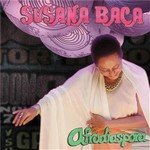For decades Peruvian diva Susana Baca has dedicated her life to the preservation and revival of Afro-Peruvian culture and music. On her latest album, Afrodiaspora, she looks outward, with a repertoire that reflects not only her heritage, but also her curiosity about music from New Orleans, Puerto Rico, and Pernambuco, to name just a few places. Singing mostly in her native Spanish with occasional excursions into Portuguese and English, Baca weaves together a diasporic tapestry of rhythms from the familiar cumbia and son to less commonly heard genres, such as the Afro-Peruvian landó and Mexican huapango (both dances in 6/8). She treats the songs on this album with the same care she takes in researching her own culture, performing them with sincerity and diligently footnoting historical and cultural references in the lyrics.
In less skilled hands, a concept like this could easily become a mess, leaving you wondering who or what you’re listening to from one track to the next. For Afrodiaspora, however, Baca’s wise decision to keep the instrumentation consistent unifies the material. The continuous presence of Spanish guitar and cajón lay a foundation of strings and percussion with ample space for Baca’s agile voice, congas, cowbells, harps, and charangos to dance on top, around, and in between. And while the texture is rooted in Peru, the band sounds comfortable in any country, even Spain (“Reina de África”), as the guitar and cajón are also staple instruments of flamenco. Wind instruments are only featured on two songs, with mixed results: the trombone and distorted harmonica help “Hey Pocky Way” come alive with the spirit of the Big Easy, but the harmonica at the beginning of “Coco y Forró” is out of context and a little too smooth compared to the punctuated grooves of the other songs.
More than just a journey through cultures and countries, Afrodiaspora is also a journey through time as well. Through her choice of folkloric songs, Baca pays tribute to icons such as Mexican singer Amparo Ochoa (“Que Bonito Tu Vestido”), Célia Cruz (“Baho Kende,” “Palo Mayimbe”), and Dona Selma do Coco (“Coco y Forró”). The band digs into some tricky triple-meter polyrhythms to bring a traditional Peruvian festejo flavor to “Hey Pocky Way,” which would otherwise be a straightforward 4/4 funk groove. That’s not to say the album is a time capsule, however— René Pérez of the band Calle 13 raps over the bomba part of “Plena y Bomba,” putting a contemporary spin on a genre that, like much of the music on the album, dates back to the days of slavery. Indeed, the unity of past and present, obscure and familiar, across continents, is Afrodiaspora’s greatest strength. And whether or not this is your first trip to Afro-Peru, you’ll be pleasantly surprised by Baca’s fresh take on classics from around the Diaspora.
-Justin Douglas








